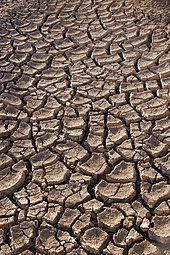period of unusually low precipitation.
A drought or drouth is a natural disaster of below-average precipitation in a given region, resulting in prolonged shortages in the water supply, whether atmospheric, surface water or ground water. A drought can last for months or years, or may be declared after as few as 15 days. It can have a substantial impact on the ecosystem and agriculture of the affected region and harm to the local economy. Annual dry seasons in the tropics significantly increase the chances of a drought developing and subsequent bush fires. Periods of heat can significantly worsen drought conditions by hastening evaporation of water vapour.
Many plant species, such as those in the family Cactaceae (or cacti), have drought tolerance adaptations like reduced leaf area and waxy cuticles to enhance their ability to tolerate drought. Some others survive dry periods as buried seeds. Semi-permanent drought produces arid biomes such as deserts and grasslands. Prolonged droughts have caused mass migrations and humanitarian crisis. Most arid ecosystems have inherently low productivity. The most prolonged drought ever in the world in recorded history occurred in the Atacama Desert in Chile (400 Years).

